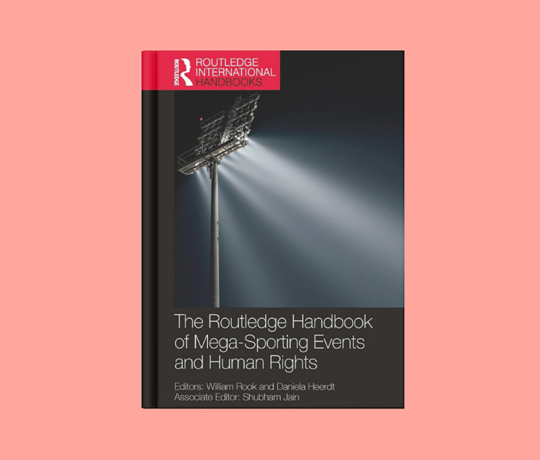
The Routledge Handbook of Mega-Sporting Events and Human Rights
The Routledge Handbook of Mega-Sporting Events and Human Rights is the first book to explore in depth the topic of mega-sporting events (MSEs) and human rights, offering accounts of adverse human rights impacts linked to MSEs while considering the potential for promoting human rights in and through the framework of these events.
Drawing on the contributions of an international group of leading researchers, practitioners and advocates, the book introduces key concepts in human rights and considers how they relate to ethical, social, managerial and governance issues in contemporary MSEs, from inclusion and welfare to corruption and sustainability. It examines the role of key stakeholders in the delivery of MSEs, including organising committees, sport governing bodies, governments, athletes, sponsors and broadcasters, as well as the role of activists and advocates, and presents historical and contemporary case studies of human rights as an active issue in MSEs. The book provides new perspectives on human rights as a lens for understanding modern sport and as a guiding principle for responsible sport that protects the interests of individuals and communities, as well as offering guidance on best practice.
It is essential reading for all advanced students, researchers, practitioners, policymakers and stakeholders with an interest in organisation and delivery of MSEs, as well as general sport management, sport policy, sport governance, the ethics of sport, event management, political science, development studies, ethical business or the significance of sport in wider society.
The Routledge Handbook of Mega-Sporting Events and Human Rights
Purchase your copy here
The Editors
William Rook is Deputy Chief Executive and Chief Operating Officer at the Centre for Sport and Human Rights, Switzerland, and a senior advisor at the Institute for Human Rights and Business, UK. He is a lawyer and business and human rights expert with experience in developing initiatives to promote responsible business conduct in emerging sectors around the world.
Daniela Heerdt is an academic, researcher and consultant in the field of sport and human rights. With a background in international public law, she conducted her doctoral research on human rights abuses in the context of mega-sporting events, specifically on how to establish legal responsibility for these abuses.
Shubham Jain is a doctoral candidate in law and a WM Tapp scholar at the University of Cambridge, UK. He researches, writes and lectures on the intersection of sports, governance, human rights, public law and merit.
The Reviews
'Major sporting events should constitute safe and inclusive environments and experiences for athletes, fans, sponsoring organizations, and hosting communities. Achievement of these goals depends substantially upon informed collaborative efforts based upon shared understandings of the challenges posed. For those looking to understand how the organization and operation of major sports events work and where there are opportunities to bring about greater equality and justice, this book is an invaluable initial point of exploration of the issues involved and potentially corrective options.'
Harry Edwards, Professor Emeritus, University of California, Berkeley, USA, and Organiser of the 1968 Olympic Project for Human Rights
'Mega-Sporting Events impact communities, athletes, workers, fans, volunteers, journalists and children worldwide. Read this ground-breaking book - it’s an invaluable resource for all working to promote human rights in sports.'
Minky Worden, Director of Global Initiatives, Human Rights Watch
'This timely publication brings together a unique range of expertise from the worlds of sport and human rights and is a helpful primer for better understanding the social dimensions of sporting events.'
Andreas Graf, Head of Human Rights and Anti-Discrimination, FIFA
'This volume is the first to comprehensively chart the intersection between human rights and Mega-Sporting Events. Its combination of concrete case studies with general chapters covering different actors, processes and norms provides a very rich overview of the question and an in-depth introduction to the many challenges it raises. The book will certainly become the go-to resource for academics, practitioners and activists looking to get a better grasp of the role played by human rights in the context of MSEs.'
Antoine Duval, Senior Researcher, Asser Institute, Netherlands